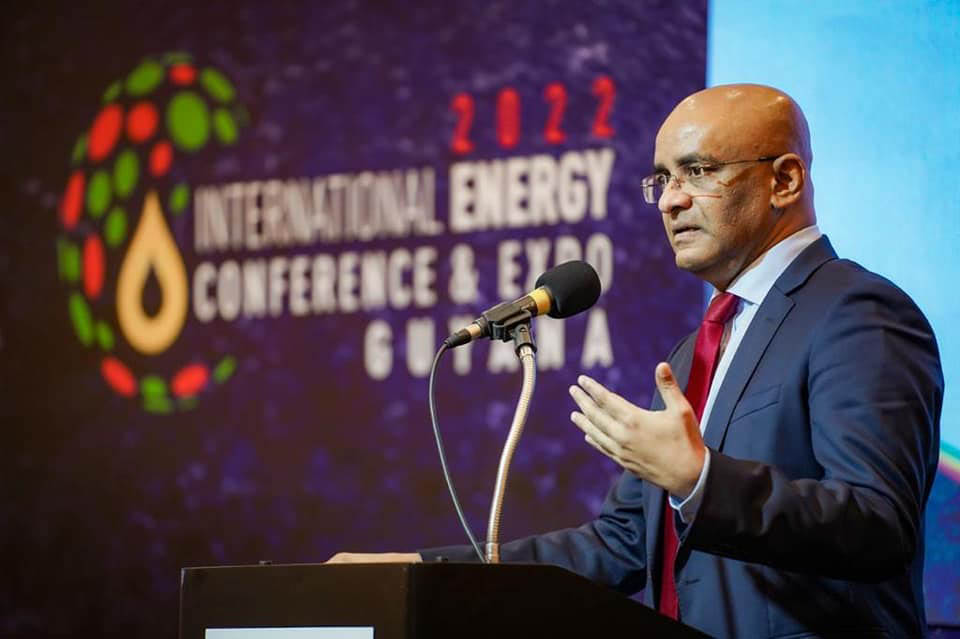A decision on the establishment of a National Oil Company (NOC) for Guy-ana will be made by the end of September this year, Vice President Bharrat Jagdeo yesterday announced as he shared insight into government’s position on key developments in the oil & gas sector.
Jagdeo, whose portfolio includes policy decisions on oil and gas, was one of the speakers at the Inter-national Energy Conference being held at the Guyana Marriott Hotel, in Kingston, Georgetown this week.
“…alternately use those blocks to form a national oil company because we have had some proposals from people in this room; large operators, to work with the government in a National Oil Company and utilise the remaining blocks…”, Jagdeo inform-ed during his brief presentation.
He explained that many persons have been expressing interest in acquiring oil blocks, but before they are permitted to do so a decision has to be made by the government. Before the end of the third quarter this year, government will decide if it will be auctioning the oil blocks with or without seismic data.
Vickram Bharrat, Minister of Natural Resources, explained that government’s mulling of a NOC came about during investment talks. He too said that a lot of the investors had been throwing out the idea to government that it was a lucrative investment. How-ever, he noted that government is doing its own research and analysis; weighing its options to ascertain what is most feasible.
Guyana has been warn-ed against investing in oil refining by a number of persons and entities.
Chatham House fellow and oil consultant Valerie Marcel had in 2019 told a conference that Guyana’s green energy transformation could be realised if it doesn’t buckle to pressure for downstream investments in oil here and the country should instead focus on diversification.
Meanwhile, Jagdeo in an update of the sale of blocks offshore said that a decision will be had at the same time.
At a press conference last November, the Vice President remarked, “We are hoping that [at] latest, next year third quarter, that we will be able to auction the new blocks. That requires us now to aggressively enforce the relinquishment provisions in all of the contracts so that, added to the existing pool of areas available… which can then form part of the auction that will take place.”
It is unclear how much of the offshore area is due back to this country through relinquishments. An agreement was entered into with ExxonMobil for its continued works in the Stabroek Block on scheduled relinquished areas and the then government had in 2019 announced that the company had relinquished 20% of the Canje Block area.
On the remaining blocks, Guyana Geology and Mines Commission (GGMC) Commissioner Newell Dennison had in 2018 told this newspaper that from the rough determinations, approximately 9,500 square kilometres (sq. km) are available within the coastal environment, 24,000 sq. km within the environment of the continental shelf, 10,000 sq. km within the deep water environment, and 9,000 sq. km within the ultra-deep water environment.
The country has two demarcated basins that have hydrocarbon potential – the Stabroek Basin, which is partly onshore and offshore Guyana, and the Takutu Basin, which is in the Rupununi area.
However, most interest has been on the offshore area and particularly in deep water following the major discoveries there by ExxonMobil in 2015.
According to a GGMC map that was updated in February 2020, there are not many areas left that have not been contracted out to companies.
The companies that have blocks in the deep water area, offshore Guyana, are: Repsol and Tullow Oil (the Kanuku Block); Tullow (the Orinduik Block); Anadarko (the Roraima Block); Ratio Oil (the Kaieteur Block); Esso, CNOOC Nexen and Hess (the Stabroek Block); Esso, Mid Atlantic and JHI (the Canje Block); CGX (the Demerara and Corentyne blocks); ON Energy; and Nabi.






